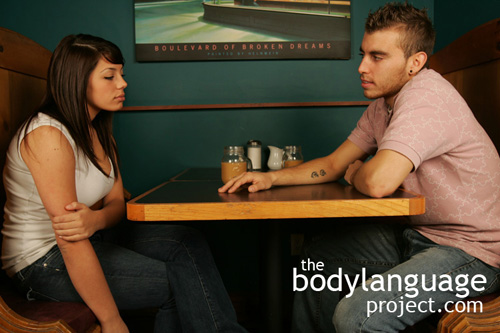Hands can show real-time changes in an attitude. Imagine a couple sitting enjoying a romantic meal at a restaurant, with their hands bridging the gap between them as they sit facing one another hand-in-hand. The topic of conversation flows freely, but suddenly switches to a contentious issue, what would you imagine would happen to their hands? When there is disagreement between people, the hands are pulling inward and away from those we disagree with. This sort of behaviour can happen suddenly especially on a heated topic, but can also happen over time on issues that gradually show differences. When total disagreement is present, the body will even be withdrawn where the hands will rest on the lap. Taking the example of the couple above once again, imagine that only one of the two experiences a change in thought to the topic, their hands might remain outstretched in the center of the table and turn palm up as if to offer the idea to their partner as if to try to change their mind. Gradually the other might re-advance to join their hands once again or move them to their lap. As the argument fails, both parties hands might graduate away. If disagreement continues, feet might orient toward the door followed by torsos than finally their heads.

Arms are withdrawn when disagreement is high. These arms are busy protecting the torso in a single arm closed body posture – an ‘incomplete hug.’
Arms withdraw for a number of reasons but our subconscious mind tunes into our flight response and pulls hands in when we fear they will be hurt, and especially when they are hurt. When we touch a hot stove or hear a loud bang, our arms draw quickly into our bodies to protect them. This happens instantly with no ability to stop it. Likewise, our hands come in when we are worried or threatened despite a lack of physical threat. When our arms come in, our minds feel that they can block attacks better even when they are emotional in nature. Hands can be withdrawn for any number of reasons, not just disagreement, such as dishonesty. Honest hands are palm up, offering something to another person, or palm down in a confident authoritative position, but when hands are pulled away, they signal hidden thoughts of disagreement and lack of connectivity.
Hands can also suddenly change in terms of use of illustrators and seem to pause, stop or slow in their rate of use. Sudden cessation of gesticulation can indicate a freeze response due to being caught in a lie especially when the context warrants it. This is part of the flight or flight response as liars are trying to seem less noticeable. They are “hiding in plain sight” and to do this it is necessary to move less as movement attracts attention. Reducing expressiveness means fewer “tells” or so the lying mind thinks. When hands that are usually busy while talking according to a baseline, suddenly begin to slow, or become less expressive, it can signal a lack of enthusiasm or confidence for the topic. Whatever happens to the hands, when they suddenly change, we know that something internal has changed and it is usually tied directly to whatever is happening in the moment.




